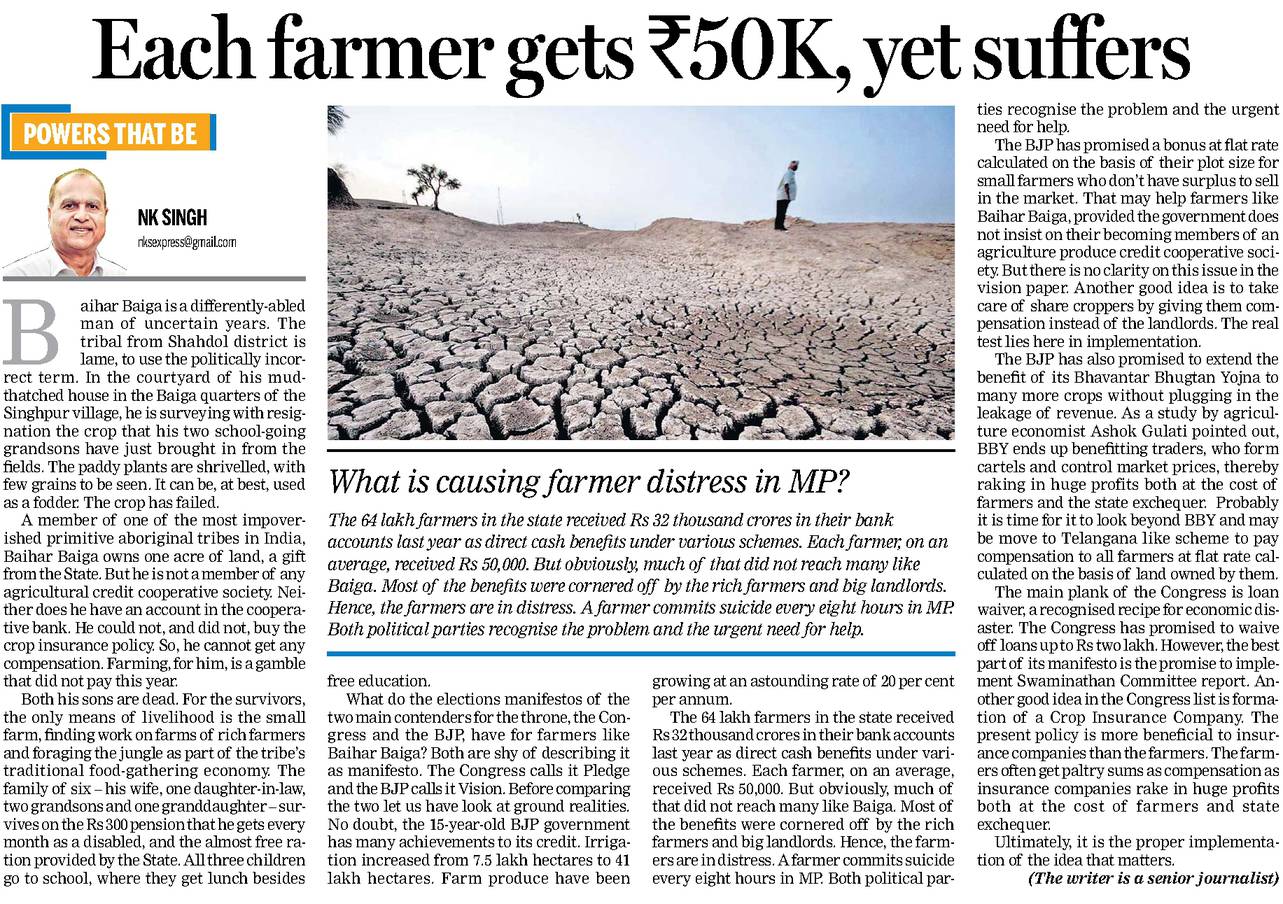NK SINGH
Baihar Baiga is a differently-abled man of uncertain years. The tribal from Shahdol district is lame, to use the politically incorrect term.
In the courtyard of his mud-thatched house in the Baiga quarters of the Singhpur village, he is surveying with resignation the crop that his two school-going grandsons have just brought in from the fields.
The paddy plants are shrivelled, with few grains to be seen. It can be, at best, used as a fodder. The crop has failed.
A member of one of the most impoverished primitive aboriginal tribes in India, Baihar Baiga owns one acre of land, a gift from the State.
But he is not a member of any agricultural credit cooperative society. Neither does he have an account in the cooperative bank. He could not, and did not, buy the crop insurance policy.
So, he cannot get any compensation. Farming, for him, is a gamble that did not pay this year.
Both his sons are dead. For the survivors, the only means of livelihood is the small farm, finding work on farms of rich farmers when they can and foraging the jungle as part of the tribe’s traditional food-gathering economy.
The family of six his wife, one daughter-in-law, two grandsons and one granddaughter survives on the Rs 300 pension that he gets every month as a disabled, and the almost free ration provided by the State. All three children go to school, where they get lunch besides free education.
What do the elections manifestos of the two main contenders for the throne, the Congress and the BJP, have for farmers like Baihar Baiga?
Both are shy of describing it as manifesto. The Congress calls it Pledge and the BJP calls it Vision. Before comparing the two let us have look at ground realities.
No doubt, the 15-year-old BJP government has many achievements to its credit. Irrigation increased from 7.5 lakh hectares to 41 lakh hectares. Farm produce have been growing at an astounding rate of 20 per cent per annum.
The 64 lakh farmers in the state received Rs 32 thousand crores in their bank accounts last year as direct cash benefits under various schemes. Each farmer, on an average, received Rs 50,000.
But obviously, much of that did not reach many like Baiga. Most of the benefits were cornered off by the rich farmers and big landlords.
Hence, the farmers are in distress. A farmer commits suicide every eight hours in MP. Both political parties recognise the problem and the urgent need for help.
The BJP has promised a bonus at flat rate calculated on the basis of their plot size for small farmers who don’t have surplus to sell in the market.
That may help farmers like Baihar Baiga, provided the government does not insist on their becoming members of an agriculture produce credit cooperative society. But there is no clarity on this issue in the vision paper.
Another good idea in BJP vision paper is to take care of share croppers by giving them compensation instead of the landlords. The real test lies here in implementation.
The BJP has also promised to extend the benefit of its Bhavantar Bhugtan Yojna to many more crops without plugging in the leakage of revenue.
As a study by agriculture economist Ashok Gulati pointed out, BBY ends up benefitting traders, who form cartels and control market prices, thereby raking in huge profits at the cost of both the farmers and the state exchequer.
Probably it is time for it to look beyond BBY and may be move to Telangana like scheme to pay compensation to all farmers at flat rate calculated on the basis of land owned by them.
The main plank of the Congress is loan waiver, a recognised recipe for economic disaster. The Congress has promised to waive off loans up to Rs two lakh.
However, the best part of the Congress manifesto is its promise to implement Swaminathan Committee report.
Another good idea in the Congress list is formation of a Crop Insurance Company. The present policy is more beneficial to insurance companies than the farmers. The farmers often get paltry sums as compensation as insurance companies rake in huge profits both at the cost of farmers and state exchequer.
Ultimately, it is the proper implementation of the idea that matters.
Powers That Be, my column in DB Post, 24 November 2018


Comments
Post a Comment
Thanks for your comment. It will be published shortly by the Editor.